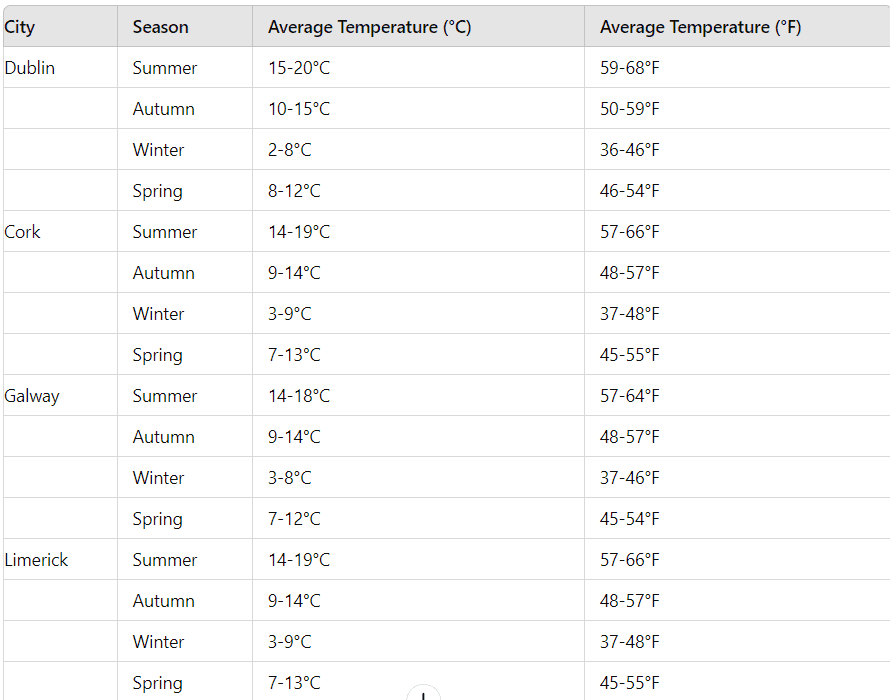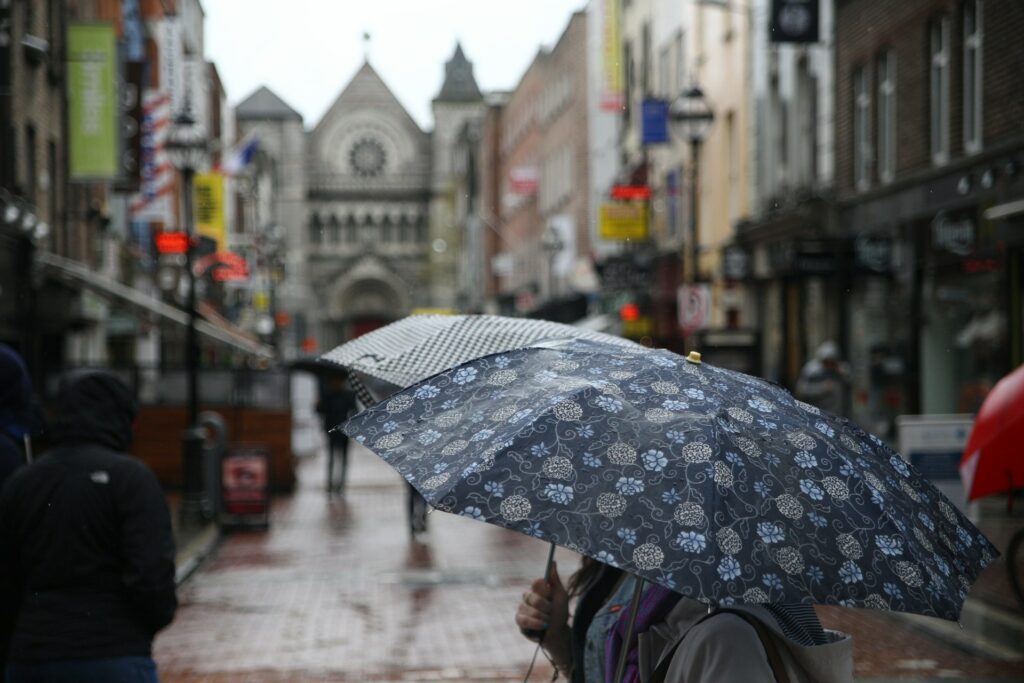Before Your Trip to Ireland
The Weather in Ireland
Ireland has a mild, maritime climate characterized by cool summers and mild winters, influenced by the Atlantic Ocean. The west coast experiences the most rainfall, especially during the autumn and winter months, while the east coast, including Dublin, tends to be drier. Temperatures rarely drop below freezing in winter or rise above 25°C in summer. The weather can be unpredictable, with frequent changes and a mix of sun, rain, and wind throughout the year. Overall, Ireland’s climate is relatively mild but often wet.

How to Dress in Ireland – Seasonal Considerations
Dressing appropriately for Ireland’s weather ensures comfort and style throughout the year. Understanding the seasonal variations will help you pack the right clothing for your trip or daily life. Here are some tips for dressing in Ireland across the four seasons:
Spring (March to May)
Spring in Ireland can be cool and damp, with temperatures gradually warming. Layering is important. Pack light sweaters, long-sleeve shirts, and a mix of jeans and lighter trousers. A waterproof jacket or trench coat is essential, along with a scarf for added warmth on cooler days.
Summer (June to August)
Summer in Ireland is mild and can be quite pleasant. Lightweight, breathable fabrics such as cotton are ideal. Bring shorts, skirts, and light trousers, along with T-shirts and light blouses. Don’t forget sunglasses and a hat for sun protection, and a light jacket for cooler evenings. Comfortable walking shoes are also a must for exploring.
Autumn (September to November)

Autumn brings cooler temperatures and increased rainfall. Opt for warm layers like sweaters, cardigans, and light jackets. Dark jeans, trousers, and boots are suitable for this season. A stylish coat and umbrella will help you stay dry during the frequent showers.
Winter (December to February)
Winter in Ireland is mild but can be wet and windy. Pack heavy coats, woolen sweaters, and thermal layers to stay warm. Scarves, gloves, and hats are essential accessories. Waterproof footwear is also important to keep your feet dry in the rainy weather.
The Currency in Ireland

The currency in Ireland is the Euro (€), used by 19 of the 27 European Union countries. Euro banknotes come in denominations of 5, 10, 20, 50, 100, 200, and 500 euros, while coins are available in 1, 2, 5, 10, 20, and 50 cents, as well as 1 and 2 euros. Credit and debit cards are widely accepted across the country. While cashless transactions are common, it’s advisable to carry some cash, especially for smaller purchases or in rural areas where card acceptance might be limited.
Where to Exchange Money in Ireland?
Exchanging money in Ireland can be done at various locations, including banks, exchange bureaus, and post offices. Banks generally offer competitive rates and are reliable options for currency exchange. Exchange bureaus, especially those found in tourist areas, are convenient but may have higher fees. Airports and major train stations also provide currency exchange services, although rates might not be as favorable. ATMs are widely available throughout Ireland and often offer good exchange rates, allowing you to withdraw euros directly using your debit or credit card.
Tips for Exchanging Money in Ireland
When exchanging money in Ireland, it’s important to compare rates and fees to get the best deal. Using ATMs is often the most convenient and cost-effective option, but check with your bank regarding foreign transaction fees. Avoid exchanging large sums at airports or tourist hotspots, where rates may be less favorable. Instead, use banks or reputable exchange bureaus. Carry small denominations for ease of transactions, and always verify the exchange rate and any associated fees before completing a transaction. Keeping a mix of cash and card options ensures you’re prepared for various situations.
The Language in Ireland
The official languages of Ireland are English and Irish (Gaelic). English is the dominant language and is spoken by nearly the entire population. Irish, while less commonly spoken in daily life, is taught in schools and used in some public signage and official documents. It is more widely spoken in the Gaeltacht regions, primarily located in the west of Ireland. While English is the primary language used in government, education, and media, Irish holds a special cultural significance and is promoted through various initiatives. Visitors will find it easy to communicate in English throughout the country, but learning a few basic Irish phrases can be a charming way to engage with the local culture.
The Necessary Documents and Emergency Contacts
Traveling to Ireland requires proper documentation and awareness of emergency contacts to ensure a smooth trip. Essential documents include a valid passport, and for many non-EU travelers, a visa. It’s crucial to check the specific entry requirements based on your nationality. Additionally, carrying copies of your passport, visa, and travel insurance can be helpful in case of emergencies. Familiarize yourself with local emergency numbers and embassy contact information before you travel.
Visa and Passport
To enter Ireland, you need a valid passport with at least six months of validity beyond your planned departure date. Citizens of EU countries do not need a visa for travel to Ireland. For non-EU travelers, a visa may be required, depending on the duration and purpose of the visit. Check the Irish consulate or embassy in your home country for specific visa requirements and application procedures. Ensure you have all necessary documents, including proof of accommodation and sufficient funds for your stay.
Travel Insurance
You must have travel insurance with a minimum medical, evacuation and repatriation coverage of US$50,000 covering all applicable dates of travel with the Tour Operator. This insurance must cover personal injury and emergency medical expenses. On the first day of each Tour, a representative of the Tour Operator will verify that you have sufficient insurance in place. You are strongly recommended to extend your coverage to include cancellation, curtailment, and all other expenses that may arise as a result of loss, damage, injury, delay or inconvenience while traveling. You acknowledge that insurance coverage is not included in the cost of any Tour offered by the Tour Operator, and you are required to obtain separate coverage at an additional cost. It is your responsibility to ensure that you have sufficient coverage and comply with the terms of the applicable insurance plans. You are responsible for advising your insurer of the type of travel, destination(s) and activities included in your booking so that the insurer may provide appropriate coverage.
Travel Vaccines for Ireland
While no specific vaccinations are required to enter Ireland, it’s recommended to be up-to-date on routine vaccines such as measles, mumps, rubella (MMR), diphtheria, tetanus, and pertussis (DTP), varicella (chickenpox), polio, and your yearly flu shot. Depending on your travel plans and health status, additional vaccines such as hepatitis A, hepatitis B, and rabies might be advised. Consult with a healthcare provider at least six weeks before your trip to discuss any health concerns and receive appropriate vaccinations.
Essential Emergency Numbers in Ireland
In case of emergencies while in Ireland, it’s important to know the essential emergency numbers:
- General emergencies: 112 or 999
- Medical emergencies: 112 or 999
- Police: 112 or 999
- Fire services: 112 or 999.
Additionally, the Gardaí (Irish police) and ambulance services can be reached through these numbers. Keep these numbers handy and accessible during your stay in Ireland to ensure prompt help in any emergency situation.
Vegetarian, Vegan and Gluten-free Eating in Ireland

Ireland has increasingly embraced vegetarian, vegan, and gluten-free diets in recent years. In major cities like Dublin, Cork, and Galway, you’ll find a growing number of restaurants offering vegetarian and vegan options. Many traditional Irish dishes can be adapted to accommodate these diets, and chefs are becoming more innovative with plant-based ingredients. Supermarkets and organic food stores also stock a wide range of meat substitutes, dairy-free products, and gluten-free items, making it easier for those with dietary restrictions to find suitable food. However, in smaller towns and rural areas, it can be more challenging to find specialized options. While awareness is growing, it’s still a good idea to learn some key phrases in English and Irish to communicate your dietary needs.
Do’s and Don’ts in Ireland
Do’s
- Greet with “Hello” Always greet people with a friendly “Hello” or “Hi”.
- Use Formal Titles, Address people with Mr., Mrs., or Miss, especially in formal settings.
- Dress Appropriately, Dress smartly, especially when dining out or visiting high-end places.
- Be Polite, Use “please” and “thank you” frequently.
- Try Local Cuisine, Be open to trying new dishes and local specialties.
Don’ts
- Avoid Loud Behavior, Loud conversations and disruptive behavior are considered impolite.
- Don’t Rush Meals, Enjoy meals leisurely; eating is a social and cultural experience.
- Avoid Discussing Money, Discussions about personal finances or salaries are considered private.
- Don’t Skip Greetings, Failing to greet people, especially in shops or cafes, can be seen as rude.
- Avoid Stereotyping, Don’t make assumptions or jokes about Irish culture or people.
What to Pack for Ireland?
Travel Adapter for Ireland
In Ireland, the standard voltage is 230V, and the frequency is 50Hz. The power plugs and sockets are of type G, which has three rectangular prongs. Travelers from countries with different plug types will need a travel adapter. It’s also a good idea to carry a universal adapter with surge protection to safeguard your electronic devices.
Wifi Access and Mobile Connectivity in Ireland
Ireland offers extensive mobile connectivity with reliable 4G and growing 5G coverage in major cities and towns. Public WiFi is widely available in hotels, cafes, restaurants, and public places, though the quality and security can vary. For travelers, purchasing a local SIM card from providers like Vodafone, Eir, or Three is a convenient way to stay connected. Ensure your phone is unlocked before you travel. Prepaid plans are affordable and offer data, calls, and text services. Rural areas might have less reliable connectivity, so plan accordingly if traveling to remote locations.
In Your Suitcase
- Clothing for Layering, Pack clothing suitable for layering, including sweaters, jackets, and scarves, especially for cooler evenings.
- Comfortable Shoes, Bring comfortable walking shoes for exploring cities and attractions.
- Formal Attire, Include smart outfits for dining out or visiting upscale venues.
- Travel Adapter, Carry a travel adapter suitable for type G plugs.
- Toiletries, Bring toiletries and personal care items.
- Sun Protection, including sunscreen, hat, sunglasses (For Summer).
- Medications, Pack any necessary medications with prescriptions.
- Probiotics, Consider packing probiotics to support digestive health while traveling.
In Your Daypack
- Water Bottle, Carry a reusable water bottle to stay hydrated throughout the day.
- Map or Navigation App, Have a map or use a navigation app on your smartphone for exploring.
- Snacks, Pack snacks like energy bars or fruits for quick refreshment.
- Guidebook, Bring a guidebook or download travel apps for information on attractions.
- Rain Jacket or Umbrella, Carry a lightweight rain jacket or small umbrella for unexpected showers.
- Camera, Bring a camera or smartphone for capturing memorable moments.










